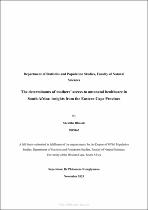| dc.description.abstract | Eastern Cape Province has historically experienced challenges in its improvements and provisions for women’s access to primary healthcare facilities. Women in the Eastern Cape province continue to lack access to antenatal care; in some cases, the mother and unborn child suffer terrible consequences. For this reason, the study aimed to identify the profile of women who access and utilise antenatal care in Eastern Cape Province. The study measured the relationship between women’s socio-demographic, socio-economic characteristics and the timing of antenatal healthcare, number of antenatal healthcare visits, and blood pressure monitoring among women living in the Eastern Cape. The study used data from the South African Demographic and Health Survey 2016. In this study, univariate analysis was employed to define the characteristics of the women. Bivariate analysis was used through cross-tabulation to determine the relationship between the women's characteristics, the timing of the antenatal healthcare visit, the number of antenatal healthcare visits, and whether their blood pressure was taken during pregnancy. Chi-square testing was conducted to assess the association between the women's characteristics and access to antenatal healthcare. Multinomial logistic regression was performed to identify the factors influencing antenatal healthcare access. The data was analysed using SPSS version 28 and Excel. The study found that age, marital status, population group, wealth index and working status influenced the women’s timing of their first antenatal healthcare visit, the number of antenatal healthcare visits and their blood pressure being monitored during pregnancy. Therefore, the South African Government, specifically the Policy Makers and the Eastern Cape Department of Health, must consider increasing awareness of the importance of proper antenatal healthcare utilisation. | en_US |

